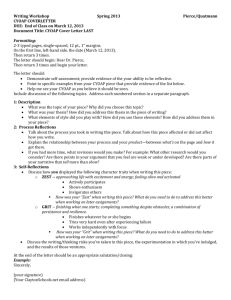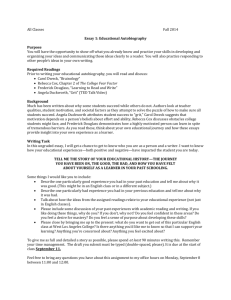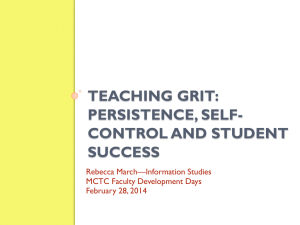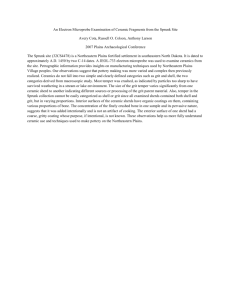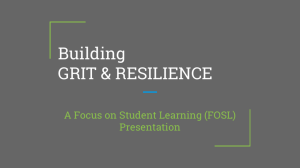Research Paper
advertisement
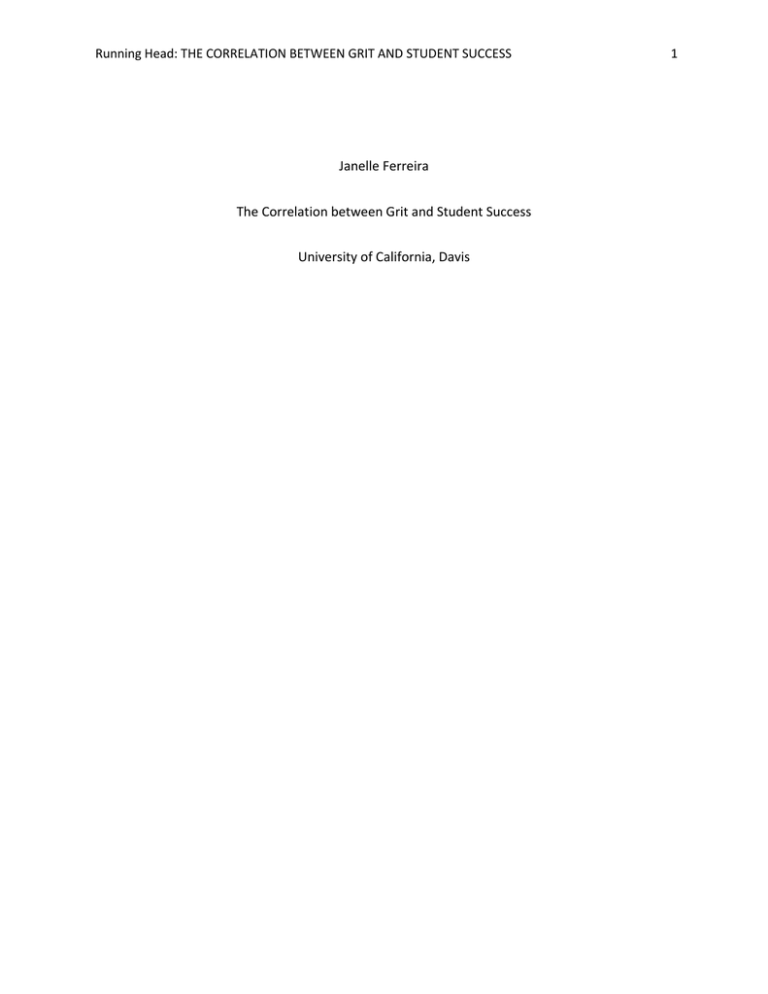
Running Head: THE CORRELATION BETWEEN GRIT AND STUDENT SUCCESS Janelle Ferreira The Correlation between Grit and Student Success University of California, Davis 1 THE CORRELATION BETWEEN GRIT AND STUDENT SUCCESS Abstract This paper examines the idea of grit, perseverance and passion for long term goals, as defined by Angela Duckworth, a pivotal psychologist in the research of grit. It seeks to prove the correlation between gritty individuals and their success in college. My research defines success based on how well students do in school in terms of GPA and their retention in school. Grit will be measured by the grit scale developed by Angela Duckworth at the University of Pennsylvania. My primary research was on University of California, Davis students which I surveyed for their grit score and I also recorded their GPA. I also cross-referenced other research done at both universities and community colleges to further investigate the relationship between grit and college success. Through this research I prove that there is a positive correlation between grit and college success in US college students both in four year institutions and community colleges. Duckworth’s idea of grit and the relationship it has to success can be broadened to explain all success because those that are grittier are more likely to achieve their goals. 2 THE CORRELATION BETWEEN GRIT AND STUDENT SUCCESS 3 The Correlation between Grit and Student Success As of today, more and more students are going to college as opposed to 40 years ago, or even 10 years ago. But even with this bigger push of students taking higher level courses in community colleges and four-year universities, “a third or more students leave four‐year public colleges and universities at the end of their first year” and about 40% of those students drop out before they earn a college degree (Kinzie, 2014, p. 333). What determines if students stay in school or drop out? It is known that successful students usually have one personality trait in common identified as grit. This leads to the question: does grit make students more successful in college? Grit is a major part of success in college, as proven by Angela Duckworth in her study on grit and long-term goals. This positive correlation between grit and how GPA and retention in school demonstrates success has been observed in various college contexts. This is shown in both prestigious four-year universities and community colleges which proves that if a student wants to be successful in post-secondary schooling, they must have grit. The bigger implications of the positive correlation between grit and student success in college can be expanded to show how grit leads to success in all aspects of life. With this newfound knowledge of how grit leads to student success, as opposed to the previous assumption that intelligence determined success, we must start teaching kids now to be grittier at a younger age, so that they can grow up to be successful members of society. What is Grit? Grit is another way to say perseverance. According to Emily Hanford (2012), “grit is sticking with things over the very long term until you master them” (para. 2). The term grit was created by Angela L. Duckworth, a psychology professor at the University of Pennsylvania. In the last few years, THE CORRELATION BETWEEN GRIT AND STUDENT SUCCESS 4 Duckworth has taken up work to better understand grit and published her work in the Journal of Personality and Social Psychology called “Grit: Perseverance and Passion for Long-Term Goals”. Duckworth (2007) defined grit as “perseverance and passion for long term goals” and said that if someone is gritty they work “strenuously toward challenges, maintaining effort and interest over the years despite failure, adversity, and plateaus in progress” (p. 1087). Her work focused on the idea that grit is important for people to succeed. To prove this, she conducted six studies and compared peoples’ grit in various contexts such as education level, satisfaction with career, college GPA, retention in a prestige military program, and success in a national spelling bee. From these studies Duckworth (2007) determined that “grit is a better predictive validity of success” than any other indicator (p. 1087). Importance of Grit in UC Davis Student Success One outcome of Duckworth’s work was the creation of the Grit Scale. The Grit Scale is a survey that Duckworth and her team created during their studies as a way for participants to selfreport how much they persevere through a questionnaire. After participants answer the seven questions, a grit score is calculated for them on a scale of 1 (not gritty) to 5 (extremely gritty). This online survey became the focus of my study to determine if grit contributes to college success in UC Davis students. For my survey I had 10 UC Davis Students complete the grit scale survey online that was created by Angela Duckworth. I asked each student to tell me the grit score they received and I also recorded their cumulative GPA. Once I had the ten students’ information, I created an x-y scatter chart on excel relating GPA on the vertical axis and grit scores on the horizontal axis. THE CORRELATION BETWEEN GRIT AND STUDENT SUCCESS 5 Looking at the chart, I found a huge correlation between their grit score and GPA which can be seen by the upward sloping trend line in the graph below. The higher their grit score, the higher the student’s GPA. This proves that grittier students are more successful in college. The higher grit score a student had led to higher grades because they presumably put in more effort to study and to prepare for their courses. The fact that grittier students earned higher GPAs shows that to be successful in classes the students must be motivated. My research also displays the correlation between grit and retention in college courses. One of the students I surveyed was a college drop out. This student’s data is indicated by the arrow on the graph. I noticed that this student had a far lower grit score than any other students I surveyed, and she was also the only one to drop out of the University of California Davis. This student’s data shows that students need grit not only to get high grades in courses, but also to continue down the long path to earn a college degree. Both of these aspects of college success, GPA and retention in college, relate to higher grit scores, proving that college courses are very demanding and the only way to do well is to be gritty; as shown by the positive correlation between grit scores and GPA. GPA GPA vs Grit Score: UC Davis 4.5 4 3.5 3 2.5 2 1.5 1 0.5 0 Drop-Out 0 1 2 3 Grit Score 4 5 6 THE CORRELATION BETWEEN GRIT AND STUDENT SUCCESS 6 Correlation of Grit and College Success Research has proven that there is a high correlation between grit and student success in various college settings from prestigious four-year universities to community colleges. Grit is made up of a group of traits determined by Brian Goodwin (2013) as “goaldirectedness (knowing where to go and how to get there), motivation (having a strong will to achieve identified goals), self-control (avoiding distractions and focusing on the task at hand), and positive mind-set (embracing challenge and viewing failure as a learning opportunity)” (p. 74). With these tools, any student can succeed in college, regardless how intelligent they are or the conditions they face. For example, Goodwin (2013) observed a young boy named Cedric Jennings, who grew up in downtown Washington D.C. in unstable living conditions because his father was always in jail and this mother did not make enough to support the family. Goodwin knew that Cedric was a successful student despite his background, so Goodwin interviewed him to find out what made him successful. Through Goodwin’s research he learned that Cedric did not let his current situation prevent him from being successful in college. Even with the odds stacked up against him, Cedric was able to graduate high school, graduate Brown University with honors, and is now pursuing graduate degrees at both Harvard University and the University of Michigan (Goodwin, 2013, p. 74). The reason Cedric was so successful was not because he was the smartest student but because he had the will to achieve his goals. His success was because of his grit — the perseverance to push forward and work towards his goals of graduating from college. This story of Cedric Jennings shows that any student can be successful in school regardless of their situation or the obstacles placed in front of them as long as they have the grit to achieve their goals. THE CORRELATION BETWEEN GRIT AND STUDENT SUCCESS 7 Duckworth Ivy League School Study Grit and college success can be seen at prestigious colleges with one of the studies that Duckworth conducted. The research question of this study at the University of Pennsylvania was whether “grit was associated with cumulative GPA among undergraduates at an elite university” (Duckworth, 2007, p. 1093). The research method of this study was 193 undergraduate students majoring in psychology at the University of Pennsylvania who volunteered to fill out the Grit Scale survey online. In addition to their grit scores, Duckworth also collected additional information such as current GPA. This study revealed that the smartest students usually were not the grittiest, but the students with the highest GPA’s tended to be the grittiest. This shows that “those who are less bright than their peers compensate by working harder and with more determination” (2007, p. 1093). The fact that the highest GPA’s went to the students with the most grit shows that student success is largely determined by grit. If a student has the will to succeed and get good grades, they will put in a lot of time and effort to ensure their success. This proves that at prestigious universities like the University of Pennsylvania, the greatest indicator of college success in terms of high GPAs is not intelligence but rather grit, the perseverance towards long term goals. Almon Community College Study Grit not only determines success in four-year universities, it also determines success for students at community colleges. In Cate Almon’s research “College Persistence and Engagement in Light of a Mature English Language Learner (ELL) Student’s Voice”, she conducted two studies on the college success and retention of English Language Learners at a community college by observing their grades and conducting interviews. In Almon’s first study she randomly selected students and compared GPAs of both ELL students and non-ELL students to see how successful ELL students were in comparison to the other students on campus. This research THE CORRELATION BETWEEN GRIT AND STUDENT SUCCESS 8 revealed that ELL students “earned a grade point average mean of 2.72, which is high enough to graduate or transfer to some universities, and significantly higher than the GPA mean of 2.32 for the sample of non-ELLs” (2015, p. 462). In the second study, Almon interviewed various ELL students at the beginning of the year. At the end of the study, Almon went back to check and see which students were still enrolled in college courses and compared that to their interview answers. Almon (2015) noticed that the students who were still enrolled were those who “talked about the extra effort they felt they needed to invest in English that would not have been required in their mother tongue” (p. 469). This shows that those who embraced the idea that learning English would take effort and planned to work harder as a response, were the ones who succeeded because they were the ones with grit. The results of both of these studies show that ELL students who have the desire, or grit, to learn English and strive in college are the ones that succeed. These students were successful because they took the extra steps to ensure their success. They also claimed to be “motivated to learn, whereas students who dropped out felt they were perhaps not sufficiently motivated” (Almon, 2015, p. 469). These students had more grit than their peers which led to their success in terms of higher grades and completion of community college courses. The fact that the students who stayed enrolled in their classes and got the highest GPAs were the grittiest shows that college successes, whether at the four-year university level, displayed in the Duckworth study, or the community college level proved by Almon’s research, comes to those that have grit, regardless of their intelligence. Conclusion The correlation between grit and college success is found in all college systems. From fouryear institutions like UC Davis and prestigious Ivy League schools like University of Pennsylvania, THE CORRELATION BETWEEN GRIT AND STUDENT SUCCESS 9 where the grittiest students had the highest grades. To the community college level where grittier students stayed enrolled in their classes and earned higher GPAs than their less gritty peers. This idea that grit leads to student success is very important because students need to be taught at a young age to be grittier. Some students may not display as much grit because of the challenges they face and will become discouraged. This may be because young children may think that if they do not succeed at something the first time around, there is no use in trying again. But this is not true, we need students to realize that to become the most successful versions of themselves, they need to put in hard work and have perseverance. To motivate children to become grittier from a young age, we must remind them that talent is not fixed and a person can do whatever they put their mind to, such as excelling in a four-year university regardless of the obstacles put in front of them. Grit also does not need to be limited to success in college. If we show students their potential when they persevere for long term goals, the upcoming generations will learn to push themselves harder and reach towards higher goals in all aspects of life. If the coming generations learn the advantage of a gritty attitude towards their goals, society as a whole will benefit. These gritty individuals with the perseverance to work towards long term goals will become innovators and be more productive. A more productive society will cause substantial growth for society as a whole, benefiting everyone. It is vital for students to realize the importance of grit in their lives which makes them more successful individuals. THE CORRELATION BETWEEN GRIT AND STUDENT SUCCESS 10 References Almon, C. (2015). College persistence and engagement in light of a mature English language learner (ELL) student’s voice. Community College Journal of Research & Practice, 39, 461-472. Duckworth, A. L. &Peterson, C. & Matthews, M.D. & Kelly, D.R. (2007). Grit: Perseverance and passion for long-term goals. Journal of Personality and Social Psychology. 92, 1087-1101. Duckworth, A. (n.d.). Online Survey Software | Qualtrics Survey Solutions. Retrieved February 23, 2015, from https://sasupenn.qualtrics.com/SE/?SID=SV_06f6QSOS2pZW9qR Goodwin, B. g., & Miller, K. k. (2013). Grit + Talent = Student Success. Educational Leadership, 71, 74-76. Hanford, E. (2012, October 2). How important is grit in student achievement? Mind/Shirt. Retrieved from http://blogs.kqed.org/mindshift/2012/10/how-important-is-grit-in-studentachievement/ Kinzie, J. (2014). Increasing persistence: research based strategies for college student success. Journal of College Student Development, 55, 332-335. THE CORRELATION BETWEEN GRIT AND STUDENT SUCCESS 11 Appendix Student Grit Score GPA 1 3.75 3.78 2 4.25 4.0 3 4.25 3.95 4 2.63 3.15 5 1.68 1.95 6 4.88 3.49 7 3.38 3.9 8 2.68 3.4 9 3.3 3.25 10 3.25 3.5 Notes Drop-Out Honors Program GPA vs Grit Score: UC Davis 4.5 4 3.5 GPA 3 2.5 2 1.5 1 Drop-Out 0.5 0 0 1 2 3 Grit Score 4 5 6
